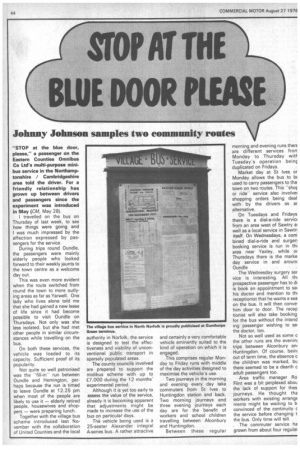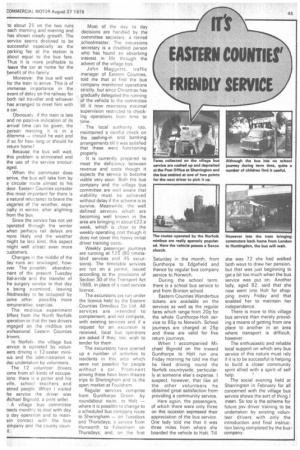* 81 1 0P AT THE
Page 46

Page 47

If you've noticed an error in this article please click here to report it so we can fix it.
BLUE DOOR PLEASE
Johnny Johnson samples two community routes
"STOP at the blue door, please," a passenger on the Eastern Counties Omnibus Co Ltd's multi-purpose minibus service in the Northamptonshire / Cambridgeshire area told the driver. For a friendly relationship has grown up between drivers and passengers since the experiment was introduced in May (CM, May 28).
I travelled on the bus on Thursday of last week, to see how things were going and I was much impressed by the affection expressed by passengers for the service.
During trips round Oundle, the passengers were mainly elderly people who looked forward to their weekly jaunts to the town centre as a welcome day out.
This was even more evident when the route switched from round the town to more outlying areas as far as Yarwell. One lady who lives alone told me that she had gained a new lease of life since it had become possible to visit Oundle on Thursdays. Not only was she less isolated, but she had met other people in similar circumstances while travelling on the bus.
On both these services, the vehicle was loaded to its capacity. Sufficient proof of its popularity.
Not quite so well patronised was the "fill-inrun between Oundle and Remington, perhaps because the run is timed to leave Oundle at 12.25 pm 'when most of the people are likely to use it — elderly retired people, housewives and shoppers — were preparing lunch.
Together with the village bus scheme introduced last November with the collaboration of United Counties and the local authority in Norfolk, the service is designed to test the effectiveness and viability of unconventional public transport in sparsely populated areas.
The county councils involved are prepared to support the midibus scheme with up to £7,000 during the 12 months' experimental period.
Although it is yet too early to assess the value of the service, already it is becoming apparent that adjustments might be made to increase the use of the bus on particular days.
The vehicle being used is a 25-seater Alexander integral A-series bus. A rather attractive and certainly a very comfortable vehicle eminently suited to the kind of operation on which it is engaged.
This comprises regular Monday to Friday runs with middle of the day activities designed to maximise the vehicle's use.
Two journeys in the morning and evening every day take commuters from St Ives to Huntingdon station and back. Two morning journeys and three evening journeys each day are for the benefit of workers and school children travelling between Alconbury and Huntingdon.
Between these regular morning and evening runs therE are different services from Monday to Thursday witF Tuesday's operation beinç duplicated on Fridays.
Market day at St Ives or Monday allows the bus to bE used to carry passengers to tha town on two routes. This "shor or rideservice also involve shopping orders being deal with by the drivers as ar alternative.
On Tuesdays and Fridays there is a dial-a-ride servic( from an area west of Sawtry a! well as a local service in Sawtn. itself. On Wednesdays, a corn bined dial-a-ride and surgep booking service is run in th( area near Yaxley, while or Thursdays there is the marke day service in and arounE Oundle
The Wednesday surgery ser vice is interesting. All thi prospective passenger has to c1( is book an appointment to se' his doctor and mention to thi receptionist that he wants a sea on the bus. It will then conve• him door to door. The recep tionist will also take booking for the bus without the intend ing passenger wishing to se' the doctor, too.
Not so well used as some o the other runs are the eveniril trips between Alconbury arm Huntingdon. Of course, beini out of term time, the absence ci the children was marked, bu there seemed to be a dearth c adult passengers too.
Area traffic manager Ro Flint was a bit perplexed abou the lack of support for thes journeys. He thought the workers with existing arrangE ments might be waiting to b convinced of the continuity c the service before changing t the bus. Only time will tell.
The commuter service ha grown from about four regular to about 25 on the two runs each morning and.evening and has shown steady growth. The service seems destined to be successful espeeially as the parking fee at the station is about equal to the bus fare. Thus it is more profitable to leave the car at home for the benefit of the fam,ly.
Moreover, the bus will wait for the train to arrive. This is of immense importance in the event of delay on the railway for both rail traveller and whoever has arranged to meet him with a car.
Obviously, if the train is late and no positive indication of its arrival time can be given, the person meeting it is in a dilemma — should he wait and if so for how long or should he return home?
Because the bus will wait, this problem is eliminated and the use of the service encouraged.
When the commuter does arrive, the bus will take him by a circular route almost to his door. Eastern Counties consider this most important for there is a natural reluctance to brave the vagaries of the weather, especially in winter, after alighting From the bus.
Since the service has not yet operated through the winter vvhen perhaps rail delays are more likely and the weather -night be less kind, this aspect -night well attract even more customers.
Changes in the middle of the Jay runs are envisaged, howver. The possible abandonment of the present Tuesday lial-a-ride and the transfer of :he surgery service to that day s being examined, leaving Nednesday to be occupied by 5ome other, possibly, more .emunerative, exercise.
The midibus experiment Jiffers from the North Norfolk )peration in that the two drivers mgaged on the midibus are )rofessional Eastern Counties Myers.
In Norfolk the village bus iervice is operated by voluneers driving a 12-seater mini)us and the administration is ilso undertaken by volunteers.
The 12 volunteer drivers :ome from all kinds of occupaions: there is a potter and his vife, school teachers and etired people. When I visited he service the driver was Aichael Bignold, a print seller.
A village bus committee fleets monthly to deal with day o day operation and to mainam n contact with the bus ompany and the county counil. Most of the day to day decisions are handled by the committee secretary. a retired schoolmaster. The excursions secretary is a disabled person who has found an absorbing interest in life through the advent of the village bus.
John Maggetts, traffic manager of Eastern Counties, told me that at first the bus company monitored operations strictly, but since Christmas has gradually delegated the running of the vehicle to the committee till it now maintains minimal supervision restricted to checking operations from time to time.
" The local authority, too, maintained a careful check on the cashing-in and banking arrangements till it was satisfied that these were functioning properly.
It is currently prepared to meet the deficiency between revenue and costs though it expects the service to become viable very soon. Both the bus company and the village bus committee are well aware that viability must be achieved without delay if the scheme is to survive. Meanwhile, the well defined services which are becoming well known in the area are bringing in about f222 a week, which is close to the weekly operating cost though it does not cover the heavy initial driver training costs.
Weekly passenger journeys are running at 125 (80 timetabled services and 45 excursions). The timetable services are run on a permit, issued according to the provisions of Section 30 of the Transport Act 1968, in place of a road service licence.
The excursions are run under the licence held by the Eastern Counties Omnibus Co Ltd. All services are intended to complement, and not compete, with existing services and if a request for an excursion is received, local bus operators are asked if they: too, wish to tender for them.
The excursions have opened up a number of activities to residents in this area which were not possible for people without a car. Prominent among these have been theatre trips to Sheringham and to the open market at Foulsham.
Regular services comprise from Gunthorpe Green„ by roundabout route, to Holt — where it is possible to change to a scheduled bus company route to Sheringham — on Tuesdays and Thursdays; a service from Hunworth to Fikenham on Thursdays; and, on the first Saturday in the month,. from Gunthorpe to Edgefield and thence by regular bus company service to Norwich.
During the school term, there is a school bus service to and from Brinton school.
Eastern Counties Wanderbus tickets are available on the services as well as the regular fares which range from 20p for the whole Gunthorpe-Holt service to 85p to Norwich School journeys are charged at 25p and these are valid for five return journeys.
When I accompanied Michael Bignold on the inward Gunthorpe to Holt run one Friday morning he told me that he liked driving round the Norfolk countryside, particularly at someone else's expense. I suspect, however, that like all the other volunteers he obtained great satisfaction from providing a community service.
Here again, the passengers, of which there were only three on this occasion expressed their appreciation of the bus service. One lady told me that it was three miles from where she boarded the vehicle to Holt. Till she was 72 she had walked both ways to draw her pension, but that was just beginning to get a bit too much when the bus service was put on. Another lady, aged 82, said that she now went into Holt for shopping every Friday and that enabled her to maintain her independence.
There is more to this village bus service than merely providing a means of getting from one place to another in an area where transport is difficult, however.
The enthusiastic and reliable local support on which any bus service of this nature must rely if it is to be successful is helping to build a closer community spirit allied with a spirit of self help.
The social evening held at Sherrington in February for all concerned with the village bus service shows the sort of thing I mean. So too is the scheme for future psv driver training to be undertaken by existing volunteer drivers with only the introduction and final instruction being completed by the buscorn pany. .




















































































